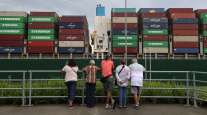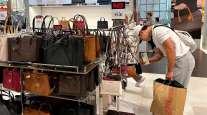Senior Reporter
ATA’s Bob Costello Presents Mixed Picture on Economy

[Stay on top of transportation news: Get TTNews in your inbox.]
ORLANDO, Fla. — The U.S. economy is poised for a short and shallow recession during the second half of the year, but circumstances specific to current economic conditions — including high interest rates, persistent inflation and a cooling housing market — make predictions more challenging than usual, said American Trucking Associations Chief Economist Bob Costello.
“All economic cycles are different, that makes them exciting,” Costello said Feb. 27 at the Moving & Storage Conference Annual Meeting. “But this one in particular — it’s very difficult to use the past to predict the future.”
For example, he noted that inflation is running ahead of the Fed’s 2% target annual rate. Plus, Costello said that while the economy saw some strong growth during 2021, much of it was fueled by trillions of dollars in federal COVID-19 assistance funneled into the economy.
“I think the most likely path for our economy is still a recession,” he said. “The timing is what’s difficult. Last fall, I was saying I think it’s a first-quarter event that flows into the second quarter and goes away. But now I think it’s more likely a second half of the year event.”

Host Mike Freeze speaks with Online Transport's Randy Obermeyer about diagnostics. Hear the program above and at RoadSigns.TTNews.com.
High interest rates have taken a particular toll on the housing market, Costello noted, a sector that’s important to trucking.
“Mortgage rates have gone up. If you’re a homeowner, why would you trade in a 3% mortgage for a 6.5% mortgage unless you absolutely have to,” he said.
Despite recent data from the U.S. Census Bureau indicating a slowdown in housing starts, Costello said he believes the sector is poised for a strong rebound. “If you look at all of the data, there is still a lot of pent-up demand for housing in this country, there really is,” he said. “The underlying fundamentals suggest we need to build more homes, and we need to sell more homes.”
However, he believes the labor market will remain tight, which will keep salaries high as workers wield more leverage.
“I suspect that everyone in this room is still challenged to find quality labor,” Costello said. “We have almost two job openings for every unemployed person in our economy. So, why don’t those people have jobs? It’s geography. They’re not all in the right spot. And it’s also quality; the jobs that are open, we don’t have qualified candidates for all of those. So, the job market remains very strong.”
The U.S. unemployment rate in January declined to 3.4%, the lowest since the spring of 1969 below the year-ago rate of 4%. Current levels are a steep drop from the 14.7% unemployment rate from April 2020 when the country was gripped by the pandemic.
It’s that shortage that Costello believes will keep wages high.
“This is going to be an issue for wages going forward,” he said. “Because we haven’t had enough immigration and population growth, the labor force is constrained. When you have more demand than you do supply, what happens to price? It goes up.”
He urged government leaders to consider changes to immigration laws to address the shortage.
Want more news? Listen to today's daily briefing above or go here for more info
“We need to prepare,” he said. “If government policies don’t change to get us more labor from outside of our borders, we are going to have a continued tight labor market and wages are going to grow at a faster pace than we have seen historically.”
Costello said industries such as trucking, and skilled trades such as carpenters, electricians and plumbers, are particularly challenged, as for some people there remains a stigma attached to blue-collar professions.
“It’s OK for young people not to go to college, and it is OK to go into an apprenticeship program and become a truck driver, an electrician or a plumber,” Costello said. “This is something we are going to have to tackle as a society.”


&uuid=(email))



